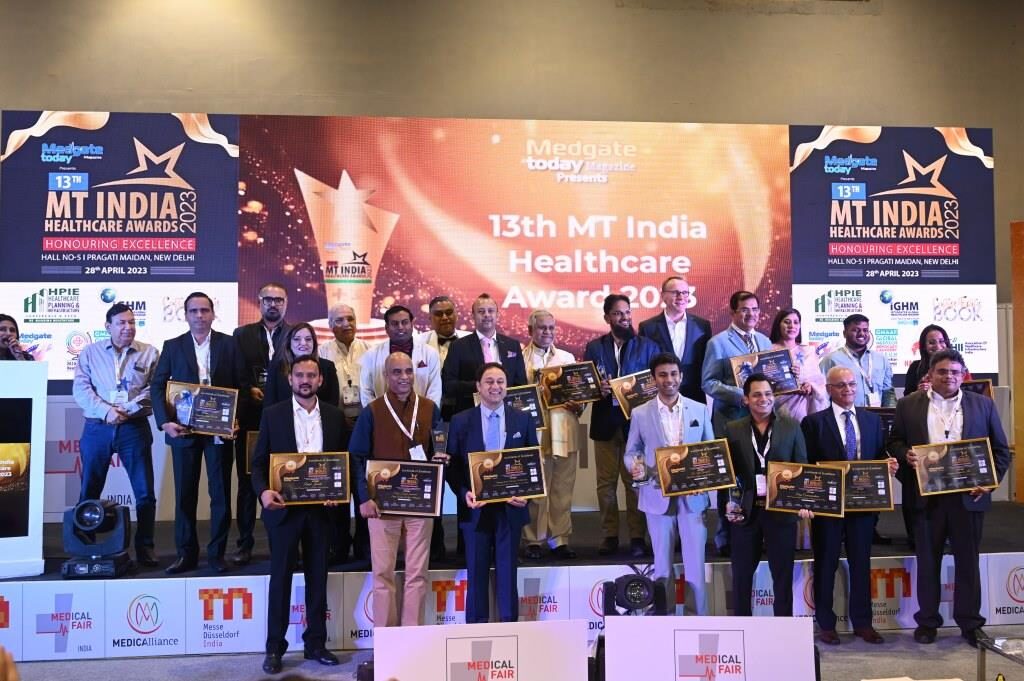FUTURE TRENDS IN DIAGNOSTICS IN INDIA: A JOURNEY TOWARDS PERSONALIZED CARE
VEENA KOHLI FOUNDER & CEO, VANGUARD DIAGNOSTICS (P) LIMITED & MANAGING DIRECTOR, DIAGON - VANGUARD DIAGNOSTICS INDIA • The Indian in-vitro diagnostics (IVD) market, • valued at US$ 1.3 billion in 2023, is on a trajectory • of significant growth, projected to reach

VEENA KOHLI
FOUNDER & CEO, VANGUARD DIAGNOSTICS (P) LIMITED &
MANAGING DIRECTOR, DIAGON – VANGUARD DIAGNOSTICS INDIA
• The Indian in-vitro diagnostics (IVD) market,
• valued at US$ 1.3 billion in 2023, is on a trajectory
• of significant growth, projected to reach US$ 2.3
• billion by 2027 with a CAGR of approximately 15%.
• This growth isn’t just about financial figures; it reflects
• a fundamental shift in how healthcare will be perceived
• and delivered across the country in the future.
Gravitation Towards Preventive Health and Wellness
The Covid-19 pandemic catalysed a seismic shift in healthcare paradigms, pushing the needle towards preventive health and wellness. As people increasingly recognize the value of proactive healthcare measures, this shift will prove to be a boon for the diagnostics sector. Comprehensive diagnostic evaluations will no longer be viewed as occasional necessities but as integral components of maintaining optimal health. This heightened awareness will not be limited to the urban areas, it will permeate across demographics, driving demand for tailored diagnostic test packages focused on preventive care.
Additionally, the convenience and accessibility offered by home collection facilities, coupled with discounted prices and online reporting, will further democratize diagnostic services. Annual health check-ups, once a luxury, will fast become the norm for a growing number of Indians.
Diagnostics – Personalized, AtHome, Wearable, Real-Time
The pandemic accelerated the adoption of home-use diagnostics, transforming devices like the pulse oximeter into household essentials akin to thermometers. This trend is expanding beyond basic tests such as – for pregnancy, glucose, ovulation etc. to encompass the detection of HIV, Cholesterol, Human Papilloma Virus (HPV), menopause and more.
Moreover, the evolution of wearable diagnostic devices will revolutionize how individuals monitor their health. Miniaturized, wearable devices capable of providing real-time health insights are no longer futuristic concepts but tangible realities. The percentage of Indians using wearable devices to track fitness and health will continue to grow. However, alongside these advancements will come the need for regulatory clarity between consumer health devices and professional medical devices, to ensure quality and safety
Leveraging Technology and Digitization
Technology will stand out as a transformation driver. From the digitization of patient records to the advent of sophisticated diagnostic tools, technology will reshape the diagnostics domain. The industry will continue to witness breakthroughs in molecular diagnostics, genetic testing, artificial intelligence, and machine learning, ushering in a new era in medical diagnostics. Personalized medicine will customize treatment plans, while the widespread use of biosensors and increased adoption of companion diagnostics will revolutionize the entire diagnostic process. Companies in the Indian diagnostic sector will need to consistently adapt and innovate through investment in research and development to keep pace with technological advancements and uphold stringent quality norms. In the future, online procurement will create a direct link between hospitals/ labs and the manufacturers, making the diagnostics industry’s supply chain shorter and more efficient.
Growing Investment and Government Support
The diagnostic sector’s growth story in India is being bolstered by a surge in investment from both domestic and international players. The release of the revised Public Procurement Order giving preference to locally manufactured products in Govt. of India tenders, is motivating multinational companies to set-up R&D and manufacturing facilities in India or to tie-up with existing Indian manufacturers
This will not only boost economic growth in the future but also strengthen indigenous capabilities in diagnostic technologies and services
Consolidation of the Diagnostics Service Sector
The diagnostics service sector comprises around 100,000 labs, with approximately 50% being standalone labs, 35% part of hospitals, and only 15% falling under the organized sector. However, the organized sector is growing the fastest through consolidation strategies.
This trend mirrors global patterns seen in markets like the United States, where a few leading lab chains like Unilab Corporation and Quest Diagnostics dominate the landscape. A transition of this magnitude, however, will necessitate the implementation of the following pre-requisites:
a) A well-defined regulatory framework for pathology labs will be paramount, ensuring standardized practices, quality control and patient safety.
b) Additionally, accreditation of labs, currently limited to a small percentage, will need to be scaled up to uphold industry standards and nurture trust among consumers.






